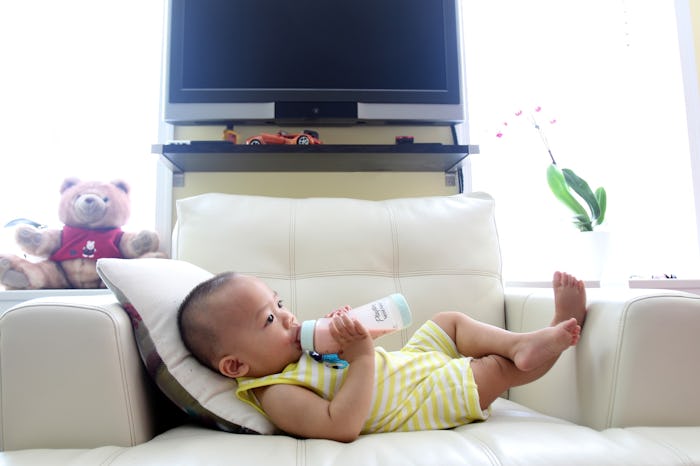For many parents, holding a tiny one close to your chest while breast or bottle feeding is one of the sweetest parts of newborn life. But at some point, the novelty might wear off, and many moms and dads find themselves spending feeding time thinking about the many things they wish they were crossing off their to-do lists instead. You spend so much quality time with your baby, is it wrong to wish for a little autonomy when it comes to bottle feeding? When can your baby hold their own bottle, and can you prop it up in the meantime?
First of all, as tempting as it may be to prop up Junior's bottle with a burp cloth so that you can get other things accomplished while he eats, don't do it. Medical wisdom is conclusive that this method consistently leads to tooth decay, increased risk for ear infections, choking, and aspirations. The many health risks of bottle propping simply don't justify the five minutes of convenience.
So if propping is out of the question, when can babies hold their own bottles? Romper reached out to Reena H. Carroll, CEO of Los Angeles-based Resources for Infant Educarers (RIE) for an interview on the subject. Carroll explains that while it's valuable to see infants "as competent beings who have the ability to hold their own bottle at a young age, our approach to breastfeeding or bottle feeding is not focused on 'teaching' the child to hold their own bottle."
Why not? What exactly is wrong with trying to move this particular milestone along? Carroll says that too much focus on your desire for the baby's independence can interfere with one of the most important elements of feeding time: connection. "The time of feeding can be used to create a comfortable, relaxed experience while holding the infant in your arms and connecting with them. This time fosters feelings of security while creating opportunities for the child to emotionally refuel and begin to learn the patterns of language as the adult talks or sings to them."
Instead of rushing to teach bottle feeding autonomy, Carroll recommends that parents reset their own mentalities to think of feeding time as one of the most important opportunities for attachment and relationship-building. Carroll says, "Until the infant is older and can sit securely alone, our approach at RIE encourages parents and adults to feed the child on the lap. This includes bottle feeding or offering the drink from a small glass. This close relationship with the adult sustains the close relationship with the child as they develop new skills." She adds that "bottle (or breast) feeding is the first step to establishing healthy eating behaviors that will last a lifetime," and should be taken seriously.
Notice that Carroll never specified an exact age when it suddenly becomes developmentally appropriate for a baby to hold their own bottle — she only mentioned the ability to sit up securely alone. That's because healthy infant development is a wide spectrum, with babies hitting the same milestones at drastically different ages. (Think: the difference between your friend's babe walking at 9 months and yours demanding to be carried until 15 months.)
While many infants will be motivated to hold their own bottles before 9 months, others may be enjoying the feeding relationship so much that they're not interested in losing the current arrangement — and that's perfectly OK. If you have concerns about your infant's development, you should definitely speak with your pediatrician about your observations. Otherwise, soak up those innocent coos while you can: It won't be long before everything becomes a battle for independence.
Check out Romper's new video series, Romper's Doula Diaries:
Check out the entire Romper's Doula Diaries series and other videos on Facebook and the Bustle app across Apple TV, Roku, and Amazon Fire TV.
